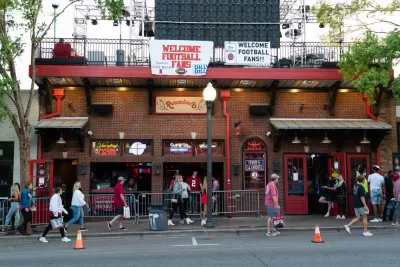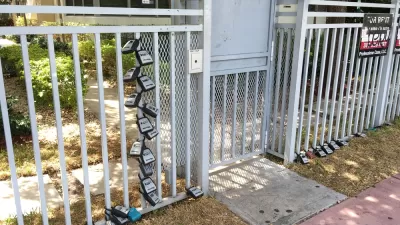Small college towns are seeing housing costs increase as out-of-town football fans buy up properties for short-term use.

"Gameday homes, investment properties where out-of-towners stay for football games and little else, are contributing to an increase in housing costs for permanent residents in Southern college towns like Starkville, according to a new study." As reported by Adina Solomon, the largely vacant units are driving up home prices in small towns without much surplus housing.
While short-term and vacation rentals are a contentious issue in many parts of the country, says Taylor Shelton, assistant professor of geosciences at Georgia State University and the study author, "based on the size, relative isolation of certain college towns in the South, and then the particular importance culturally of college football, that it’s in those places that this phenomenon is really the biggest deal." In Starkville, Mississippi–Shelton's case study–he estimates that 5 to 10 percent of housing units are gameday homes. "In some neighborhoods, more than 75 percent of housing units are used for just the six weekends a year when college football teams play home games."
The impact of gameday homes tends to be "concentrated in smaller cities, either without a large housing supply or nearby towns to absorb the demand for housing." Yet local officials haven't done much to address the problem. "[C]ities like collecting property taxes on gameday homes because they’re assessed at a higher value. The local government also needs to provide minimal services since owners don’t use a lot of water and electricity and don’t enroll their kids in the school district." According to Shelton, "[w]hat cities need to be focused on is how they can address the housing market concerns or the quality of life issues that arise from prime housing in the city sitting vacant the vast majority of the time and contributing nothing to the quality of life and experience of people who choose to make these places their home."
FULL STORY: Gameday Homes Increase Housing Prices in Southern College Towns

Maui's Vacation Rental Debate Turns Ugly
Verbal attacks, misinformation campaigns and fistfights plague a high-stakes debate to convert thousands of vacation rentals into long-term housing.

Planetizen Federal Action Tracker
A weekly monitor of how Trump’s orders and actions are impacting planners and planning in America.

In Urban Planning, AI Prompting Could be the New Design Thinking
Creativity has long been key to great urban design. What if we see AI as our new creative partner?

King County Supportive Housing Program Offers Hope for Unhoused Residents
The county is taking a ‘Housing First’ approach that prioritizes getting people into housing, then offering wraparound supportive services.

Researchers Use AI to Get Clearer Picture of US Housing
Analysts are using artificial intelligence to supercharge their research by allowing them to comb through data faster. Though these AI tools can be error prone, they save time and housing researchers are optimistic about the future.

Making Shared Micromobility More Inclusive
Cities and shared mobility system operators can do more to include people with disabilities in planning and operations, per a new report.
Urban Design for Planners 1: Software Tools
This six-course series explores essential urban design concepts using open source software and equips planners with the tools they need to participate fully in the urban design process.
Planning for Universal Design
Learn the tools for implementing Universal Design in planning regulations.
planning NEXT
Appalachian Highlands Housing Partners
Mpact (founded as Rail~Volution)
City of Camden Redevelopment Agency
City of Astoria
City of Portland
City of Laramie





























